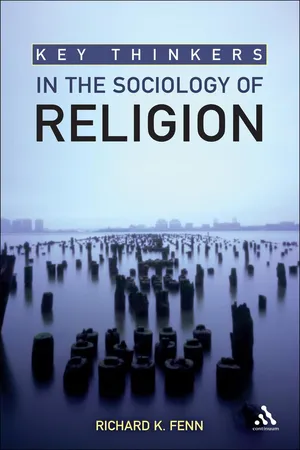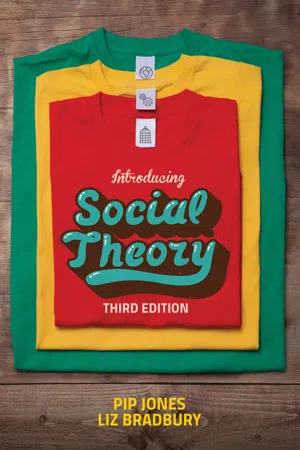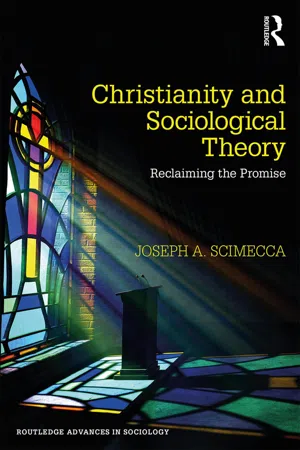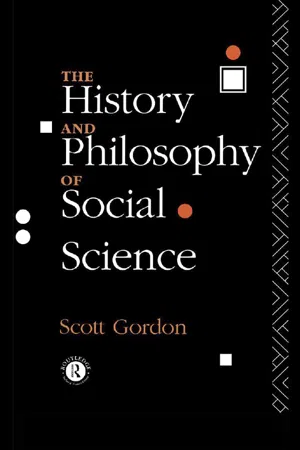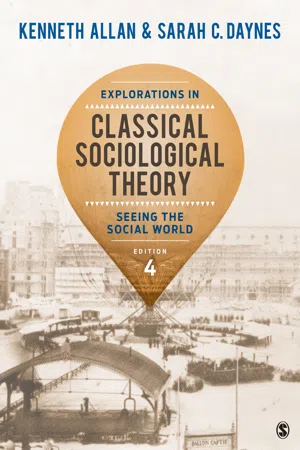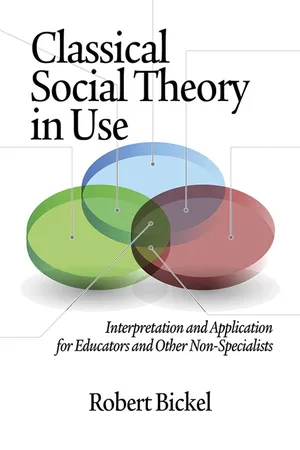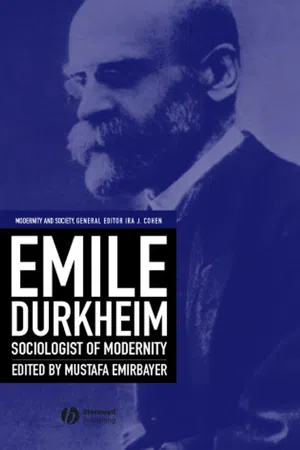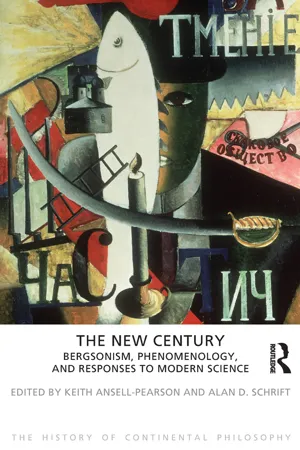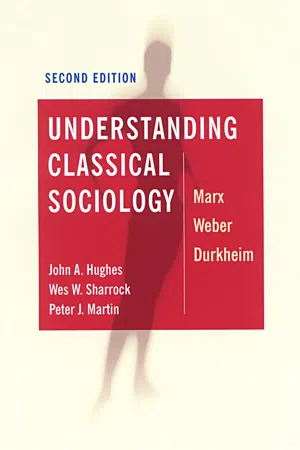Social Sciences
Émile Durkheim Sociology
Émile Durkheim was a prominent figure in the development of sociology, focusing on the study of social facts and the role of institutions in shaping society. He emphasized the importance of social integration and solidarity in maintaining social order and stability. Durkheim's work laid the foundation for the structural-functional approach in sociology, which examines how social institutions contribute to the functioning of society.
Written by Perlego with AI-assistance
Related key terms
1 of 5
12 Key excerpts on "Émile Durkheim Sociology"
- eBook - PDF
- Richard K. Fenn(Author)
- 2009(Publication Date)
- Continuum(Publisher)
Emile Durkheim Emile Durkheim (1858–1917) is widely known as one of the founders of modern sociology. The usual summary of his work points to his find-ings that modern societies depend for their coherence and continuity on quite traditional foundations: a common set of beliefs and values, whether they are called culture or religion. Most summaries of his work point out that he derived these foundations from society itself and leaves unexplained how the social order could be based on something of its own creation. Concerned with the moral education of the French student, he sought to remind individuals that their very being, as well as their aspirations and convictions, were derived from the society toward which they owed a debt of moral obligation. On the other hand he argued that the collective sentiments of any society derive from the imaginations and passions of individuals themselves. Despite the obvi-ous contradictions in his work, his essays have continued to foster a wide range of sociological and social anthropological studies. For Durkheim the social order begins and continues as a figment of the collective imagination. Originating in moments of extraordinary pressure or excitement, the feelings that are generated on such occa-sions become symbolized in people and objects, and at certain times and places take on a renewed life of their own. Although the social order is really a collective fiction, it imposes itself on the individual psyche with a weight and intensity that can separate individuals from any sense of their own being or even crush their psyches. As Weber noted, individuals seek to acquire a solid and underived sense of their own being. Durkheim enables us to understand why they would have this need. Because they experience the self as a by-product or derivation of the social order, individuals lack precisely this sense of their own 16 Emile Durkheim selfhood as a given and thus not as not derived from some other source. - eBook - PDF
- Syed Farid Alatas, Vineeta Sinha(Authors)
- 2017(Publication Date)
- Palgrave Macmillan(Publisher)
From the outset, Sociology (coupled with the methodology of science and an awareness of moral questions) was for Durkheim a discipline with a critical and reforming mission. While his contributions to developing Sociology in France are well known, his role in helping to institutio- nalize the Sociological Society in London is less known. 4 Brandford notes that the society’s ‘promoters enlisted the sympathy and aid of Durkheim’. Moreover, during the first session of the Society, he sent over a paper (prepared in co-operation with E. Fauconnet, a former pupil, become colleague) to be read on the ‘Relation of Sociology to 3 Emile Durkheim, L’Année Sociologique, 1 (1987), 1–70. 4 Victor Brandford, ‘Durkheim: A Brief Memoir’, The Sociological Review, 10(2) (1918), 77–82. Emile Durkheim (1858–1917) 173 the Social Sciences, and to Philosophy’. 5 Additionally, Durkheim attracted a band of followers, students and disciples. His interlocutors included such figures as Marcel Mauss (Durkheim’s nephew), Henri Hubert, Francois Simiand, Georg Simmel, Paul Fauconnet, George Davy and Charles Bougle, 6 all of whom were independent thinkers in their own right. Durkheim was an engaged academic, scholar and intellectual. He may have lacked the passionate and direct activism of Karl Marx, but he none- theless diagnosed the problems of modernity and sought to prescribe social reforms. He was active in French public life and imagined a ‘practical’ Sociology that was directed towards social progress. Durkheim was pro- foundly moved and disturbed by the foundational socio-economic and political changes that were occurring in nineteenth-century France and in other parts of Western Europe. Durkheim’s conviction that the emerging modern, industrial society was defined by economic, social, political and moral crises led him to reflect on the fate of the individual under conditions of modernity. - eBook - PDF
- Harry Alpert(Author)
- 2019(Publication Date)
- Columbia University Press(Publisher)
Sociology, in Durkheim's opinion, had too long limited itself to general questions such as the nature of society, the nature of the family, the course of social evo-lution, etc. Before questions of this kind can be adequately answered, however, a good deal of preliminary spade work 62 Cf. the annees sociologiques of the R M M , III (1895), 308-339; IV (1896), 338-361 ; and V (1897), 489-519 with any volume of Durkheim's Annee. See the analysis of volume V below. 63 A S, prefaces to vols. I and II. For Durkheim's conception of sociology as the corpus of the social sciences, see 03c, pp. 46s ff.; 09ε, esp. pp. 276-278; 00c, pp. 127-148. These articles are the best expression of the view of socio-logy underlying the Annee. 4 8 E M I L E D Ü R K H E I M A N D H I S S O C I O L O G Y must be undertaken. Data must be collected, facts must be substantiated, particular societies and specific institutions must be analyzed. To this endeavor too the Amice dedicated itself. Thus to the motto: unity of the social sciences was added the slogan: specificity of research. It may be noted that the Annie's first article, Durkheim's essay on the prohibition of incest, was a specialized study of a specific institution, and that practically all the succeeding memoires were of the same nature. Dürkheim had still a third intention in founding the Annee. Science is essentially a cumulative body of systematic knowl-edge and necessarily involves cooperative action on the part of many persons. It is therefore a collective, not a personal enter-prise. Its ideals of objectivity and impersonalness are admir-ably fostered by a team of workers performing specialized tasks in a common endeavor. Consequently, if the science of sociology is to be objective and impersonal, it must be co-operative and collective. Thus far, Dürkheim thought, it has been too personal, too dependent on the individuality of the particular writer. - eBook - ePub
- Pip Jones, Liz Bradbury(Authors)
- 2017(Publication Date)
- Polity(Publisher)
positivism as the methodology for the new science of sociology. Durkheim criticized Comte’s work for being over-reliant on philosophical speculation, whereas Durkheim wanted to develop a scientifically precise approach to the carefully controlled strengthening of the moral climate of France in a progressive direction. This was deemed necessary because France was experiencing not only the political and cultural crises mentioned above but also rapid industrialization. This latter had allowed capitalism to develop in an unregulated manner, which led to class conflict, unregulated competition and routinized, degrading, meaningless work (Lukes 1973: 174). All of these issues cried out for the scientific study of society’s collective moral beliefs as sources of social cohesion. Durkheim thus saw the role of sociology as similar to that of a medical physician who applies scientific techniques to distinguish between health and illness and to prescribe the appropriate remedy for the latter. The medicine required in this case was an answer to how the process of transition from traditional to modern values could achieve a balance between respect for individual freedom and a strong sense of community.Social structure
For Durkheim, the crucial feature of social structures is that they are made up of norms and values – cultural definitions of behaviour considered appropriate and worthy in different settings. Since it is through socialization that we learn these normative definitions, it is only this process which moulds people into members of a society and therefore makes social life possible.It was Durkheim who first of all stressed the view that the thoughts and experiences of individuals are inherited, and not invented anew by each generation. For example, people who attend a religious service may believe sincerely in their god. But the beliefs and practices of their religion were in existence before they were – they learned - eBook - ePub
- Pip Jones, Liz Bradbury, Shaun LeBoutillier(Authors)
- 2015(Publication Date)
- Polity(Publisher)
positivism as the methodology for the new science of sociology. Durkheim criticized Comte’s work for being over-reliant on philosophical speculation, whereas Durkheim wanted to develop a scientifically precise approach to the carefully controlled strengthening of the moral climate of France in a progressive direction. This was deemed necessary because France was experiencing not only the political and cultural crises mentioned above but also rapid industrialization. This latter had allowed capitalism to develop in an unregulated and unjust manner and led to class conflict, unregulated competition and routinized, degrading, meaningless work (Lukes 1973: 174). All of these issues cried out for the scientific study of society’s collective moral beliefs as sources of social cohesion. Durkheim thus saw the role of sociology as similar to that of a medical physician who applies scientific techniques to distinguish between health and illness and to prescribe the appropriate remedy for the latter. The medicine required in this case was an answer to how the process of transition from traditional to modern collective values could be best achieved.Social structure
For Durkheim the crucial feature of social structures is that they are made up of norms and values – cultural definitions of behaviour considered appropriate and worthy in different settings. Since it is through socialization that we learn these normative definitions, it is only this process which makes people into members of a society and therefore makes social life possible.It was Durkheim who first of all stressed the view that even the possibilities of thought and experience are inherited, and not invented anew by each generation. For example, people who attend a religious service may believe sincerely in their god. But the beliefs and practices of their religion were in existence before they were – they learned them. Like all other social activity, religious belief and practice is structured by society and by the positions of people in it. As Durkheim puts it:When I perform my duties as a brother, a husband or a citizen and carry out the commitments I have entered into, I fulfil obligations which are defined in law and custom and which are external to myself and my actions. Even when they conform to my own sentiments and when I feel their reality within me, that reality does not cease to be objective, for it is not I who have prescribed these duties; I have received them through education … Similarly the believer has discovered from birth, ready fashioned, the beliefs and practices of his religious life; if they existed before he did, it follows that they exist outside him. (Durkheim 1982 [1895]: 50–1) - eBook - ePub
Christianity and Sociological Theory
Reclaiming the Promise
- Joseph A. Scimecca(Author)
- 2018(Publication Date)
- Routledge(Publisher)
5 DURKHEIM AND THE INSTITUTIONALIZATION OF SOCIOLOGY As we saw, well before Comte coined the term “sociology,” its origins can be traced to the Scholastics, the Christian Humanists, and the Enlightenment Philosophes. However, it was only when sociology became institutionalized in the university that it became a bona fide discipline. Accordingly, it was Emile Durkheim in France and Max Weber in Germany who were among the first classical theorists to legitimate sociology as a field of knowledge worthy of study in the academy. In so doing, they began by reacting to Marx’s emphasis on a materialistic science that was devoid of a religiously based (Christian) moral society. It was Durkheim and Weber who attempted to fashion a nascent social science that would explain the secularization of the Western world, a world where science was coming to be seen as replacing religion as the preeminent method for understanding human behavior. However, although both men agreed with the growing secularization of the world, they differed in their views of the form that this new social science (sociology) should take. Durkheim envisioned sociology as a positivistic social science, one that explained how social forces acted upon individuals. Weber’s approach was more of an interpretive sociology, one that focused on the interaction of individuals and the meaning they attached to these interactions. In so doing both men confronted the role of Christianity, which despite growing secularization was still the prevailing worldview in Europe - eBook - ePub
- H. Scott Gordon(Author)
- 2002(Publication Date)
- Routledge(Publisher)
Durkheim aimed to establish sociology, not merely as a discipline that investigates a delimited area of social phenomena or specific problems such as the basis of social solidarity, but as the foundation science for all social research. In his view, economics, political science, history, and the other conventionally defined areas of social research cannot achieve scientific status until they adopt the methodological principle that social phenomena must be explained by other social phenomena. The study of the material realm of existence had become scientific by undertaking to explain events in terms of general laws that link material effects to material causes, eschewing theological and other concepts that are non-materialistic in nature. So, likewise, since the social realm has its own ontological autonomy, a truly scientific study of social phenomena aims at the discovery of laws that are exclusively social. Durkheim regarded the social sciences of his time as flawed by their inclination to explain social phenomena in terms of factors that operate at the level of individual consciousness and volition. History and political science typically attempt to explain social events in terms of the thoughts and decisions of kings and generals; economics enlarges the domain of explanation to include less magisterial beings but, in accordance with utilitarian psychology, their behaviour is construed as reflecting the operation of individualistic rationality and motivation. Durkheim’s ‘sociological point of view’ was an attack upon the tradition of reductionism in the social sciences.One of the reasons why Durkheim is regarded as the father of modern sociology is that, not only did he assert the sociological point of view as a matter of epistemological principle, but he exemplified it by specific studies. The most important of these are his books on suicide and religion. Some brief attention to these is useful in furthering one’s understanding of Durkheim’s insistence that one must rigorously adhere to the domain of the social, neither descending below it nor ascending above it, in seeking the causes of phenomena that bear the mark of sociality.In The Rules of Sociological Method Durkheim points out that in attempting to identify a ‘pathological’ social condition one must employ as a standard of reference not some abstract conception of the ideal state, but empirical evidence of what is ‘normal’ in societies of the type under consideration. Crime, for example, is not necessarily pathological, since, in normal circumstances, there will be a certain incidence of crime. When the crime rate exceeds what is normal for a society of that type, it is due to social factors and, therefore, must be explained in sociological terms. The same is true of suicide. Each suicide, like each crime, is an individual act, but a suicide rate higher than the normal is evidence that some individuals are driven to acts of self-destruction by social causes. Durkheim’s analysis of suicide as social pathology centres on his view of the importance of social solidarity. In The Division of Labour he refers to the weakening of solidarity by the degeneration of social bonds as a condition of ‘anomie.’ In Suicide he develops this further. Some suicides are ‘egoistic’ (e.g. the suicide of a person suffering from a painful illness); some are ‘altruistic’ (e.g. the act of a soldier who throws himself on a grenade to protect his fellows); some are performed by persons who suffer from a sense of dissociation from their society, a condition of ‘anomie’ so acute that life is unbearable (e.g. the suicide of a person who has been ostracized; this and the preceding illustrations are my own, not Durkheim’s). Under normal conditions there will be a certain rate of suicide, including some suicides that are due to anomie. But a suicide rate that is significantly higher than normal can only be due to an erosion of solidarity which generates more widespread, and more intense, anomie; its causes, therefore, are social. - eBook - ePub
Explorations in Classical Sociological Theory
Seeing the Social World
- Kenneth Allan, Sarah Daynes(Authors)
- 2016(Publication Date)
- SAGE Publications, Inc(Publisher)
Durkheim sees individuals apart from society as concerned only with their own desires that, because of human nature, are insatiable. Thus, the one thing society needs above all else is a common, moral culture—a set of ideas, values, beliefs, norms, and practices that guide us to act collectively rather than individually. Given that moral culture is the basis of society, Durkheim argues that society first began in religion. Modernity, however, creates a problem that threatens to tear apart society’s moral basis: social diversity created through structural differentiation and the division of labor. The main solution to this problem is an evolving, more general moral culture—able to embrace greater levels of social diversity—through the formation of intermediary groups, restitutive law, the centralization and rationalization of law, and social and structural interdependency.Key Ideas
Social will, state of nature, social contract, primal society, four conditions for social science, social facts, society sui generis, collective consciousness, religion, sacred and profane, ritual, effervescence, social solidarity (mechanical and organic), punitive and restitutive law, the division of labor, social differentiation, cultural generalization, intermediary groups, social pathologies, anomie, suicide (altruistic, fatalistic, egoistic, and anomic), the cult of the individual.The Sociological Imagination of Émile Durkheim
Durkheim was born in France when it was at the cusp of bringing to reality the republican vision of government and enlightenment that began in 1792. Its struggles with monarchs and emperors were coming to an end. The institution of education that had been the purview of the Catholic Church was moving toward scientific, positive instruction. During Durkheim’s lifetime, France made significant strides forward in creating a transportation infrastructure, which gave a boost to economic development and personal income levels. It was a time of hope and forward vision, an environment in which Durkheim thrived.Durkheim’s Life
David Émile Durkheim was born in Epinal, France, on April 15, 1858. Durkheim’s mother, Mélanie, was a merchant’s daughter, and his father, Moïse, was a rabbi, descended from generations of rabbis. Durkheim studied the Hebrew language and Jewish law, no doubt in preparation for becoming a rabbi himself. However, shortly after his Bar Mitzvah at age 13, Durkheim considered Catholicism for a brief time. Durkheim didn’t become Catholic, but neither did he return to his rabbinical studies. He continued on with his secular studies and was considered an outstanding student. With hopes of becoming a teacher, Durkheim moved to Paris to attend the École Normale Supérieure, - eBook - PDF
- Robert Bickel(Author)
- 2008(Publication Date)
- Information Age Publishing(Publisher)
Emile Durkheim 205 dimentary. Even people who interacted with each other only in church on Sunday and at occasional community meetings held in the local school- house experienced the world in much the same way. Social life in a densely populated, increasingly urban, complex indus- trial world, however, is quite different. A much more complex division of labor, in spite of its costs in terms of breadth of individual mastery, is es- sential for economic productivity and a practically manageable social and political life. At the same time, specialization makes us inescapably interdependent, in need of each other’s services, as one role complements another in a complex role set, with each role having its own repertoire of behaviors for giving specific forms of value to a shared environment. The existence and taken-for-granted appreciation of this sort of role-to-role, person-to-person complementarity, Durkheim held, would organize us together in a com- mon social endeavor, namely, maintenance of the social system in which we were all embedded. This complex division of labor, thus, is the new basis for social solidarity, largely replacing mechanical solidarity. Fundamentally, as with mechanical solidarity, organic solidarity is a moral phenomenon, and Durkheim described it as such. Failure to sponta- neously and unself-consciously recognize and act in accordance with inter- dependence, reciprocity, and complementarity gives rise to the cutthroat normlessness that Durkheim recognized as characterizing the relationship between capital and labor. Under such adverse circumstances, nothing is inviolate. Nothing is sacred. Everyone is out for himself. If normative chaos becomes generalized across all institutions, eventually the social system los- es all cohesion and ceases to exist. A stable social system, thus, is based on social and economic comple- mentarity and instantaneous appreciation of same, even in the absence of a richly endowed collective consciousness. - eBook - PDF
Emile Durkheim
Sociologist of Modernity
- Mustafa Emirbayer, Ira J. Cohen(Authors)
- 2008(Publication Date)
- Wiley-Blackwell(Publisher)
The chapter then turns to the topic of socialism. In Socialism and Saint-Simon , Durkheim defines socialism, dis-tinguishes its major variants, and, in passages reminiscent of his discus-sions of anomie in Suicide (see chapter 1), reflects upon its inherent moral limitations. Moral reflections continue in The Division of Labor , to which the chapter then returns. First we encounter an important statement of Durkheim’s moral psychology, a rumination on the sources, meaning, and limitations of individual happiness. Then we turn to more substant-ive analyses – Durkheim’s critiques of the modern economy itself – which we find cast precisely in the same terms as his moral analyses. Extended excerpts on the “anomic” and “forced” variants of the division of labor show Durkheim to be simultaneously a moralist and a profound critic of today’s economy, one whose indictments encompass the “pathological” social structure, culture, and collective emotions alike of contemporary industrial capitalism. The usefulness of Durkheim’s arguments with respect to economic life is then demonstrated by two brief excerpts by later writers. One, by James Scott, returns to the theme of the non-contractual elements in economic relationships by highlighting the moral principles of “reciprocity” and “right to subsistence” that are “woven into the tissue” of traditional peasant societies. The other, by Amitai Etzioni, shifts attention back to modern industrial capitalism, but similarly underscores the importance of “pre-contractual . . . social bonds” in pro-viding the basic framework for economic institutions and practices. D URKHEIM S ELECTIONS From The Division of Labor in Society Emile Durkheim, The Division of Labor in Society , trans. W. D. Halls (New York: Free Press, 1984), pp. 141, 151–63. The law we have established . . . in one characteristic, but in one char-acteristic alone, may have reminded us of the one that dominates the sociology of Spencer. - eBook - ePub
The New Century
Bergsonism, Phenomenology and Responses to Modern Science
- Keith Ansell-Pearson, Alan D. Schrift(Authors)
- 2014(Publication Date)
- Routledge(Publisher)
Socialism would not “dispense with money” nor suppress the essential “industrial and commercial freedom” of the modern economy. Essentially socialism should maintain and “respect … intermediary collectivities.” Indeed, “Durkheim’s hypotheses about the moral and economic value of the professional group emerge further confirmed. The Soviets failed precisely because they undermined and destroyed this primordial organizational element.” 98 Essential political conclusions follow: “violence is only legitimate via the law, via the legal order whose reign it supports: it is not itself order, still less faith”; second, “naïve sociologists, the Communists believed that the order of sovereignty, the law, can create … from nothing … the law does not create, it sanctions.” 99 The Durkheimians clearly aimed to decamp from philosophy, the discipline in which they were formed, into a positive science. They did not think that this involved an epistemological break, since their notion of philosophy was that it was already a science from the point of view of its methodology and logic. What they wanted was to put this science to use. The philosophers who did not take this route were, in their view, taking a path into a profoundly reactionary mysticism or scholasticism. But in their own practice, it seems clear to conclude that Durkheimian philosophy evolved into a radicalized Kantianism formed out of the French tradition of Cousin and Renouvier that they then applied to Comte in order to regenerate sociology and anthropology. What they produced was an experimental rationalism that had learning from errors as its objective. MAJOR WORKS Durkheim De la division du travail social: Étude sur l’organisation des sociétés supérieures. Paris: Félix Alcan, 1893. Published in English as The Division of Labor in Society. (i) Translated by George Simpson. New York: Macmillan, 1933 [page references are to the 1964 edition]. (ii) Translated by W. D. Halls - eBook - ePub
Understanding Classical Sociology
Marx, Weber, Durkheim
- John A Hughes, Wes Sharrock, Peter J Martin(Authors)
- 2003(Publication Date)
- SAGE Publications Ltd(Publisher)
Indeed, the nature of the individual and his or her capacity to make individual decisions has to be understood as a product of society. The very ‘individualism’ of modern society is a result of its social structure. The notion of individualism through which we celebrate our independence and our diversity is itself a socially shared and standardised ideology. It is important to stress that Durkheim does not seek to assert society over the individual, but only to reject a false opposition between ‘individual’ and ‘society’, reminding us that our undoubted autonomy from other individuals is concomitant with our mutual dependence with those same individuals in the social division of labour. And nowhere is the attempt to emphasise this balance in the relationship between individual and society more apparent than in Durkheim’s most famous, not to say notorious, study, Suicide (1893). Autonomy and Constraint Suicide achieved its notoriety through its promotion as the model for sociology as a scientific discipline, and this, largely, because it features the extensive use of statistics. Though Durkheim drew, for this work, upon a well-established French tradition of the study of suicide statistics, his use of such statistics was pioneering. In seeking to understand the causes of stability and change in the suicide rate, Durkheim recognised the fact that in the study of social life the experimental method, which he felt to be so decisive for the success of the natural sciences, cannot be employed. The experimental method is decisive in the natural sciences in singling out causes, and if sociology is to be a science and therefore, on Durkheim’s understanding, to give causal explanations of phenomena, it must contrive some alternative to the experiment
Index pages curate the most relevant extracts from our library of academic textbooks. They’ve been created using an in-house natural language model (NLM), each adding context and meaning to key research topics.
